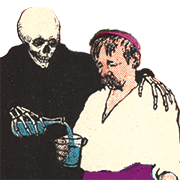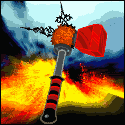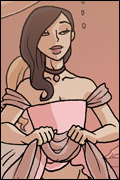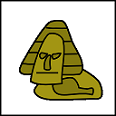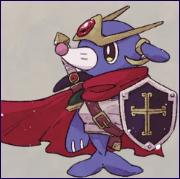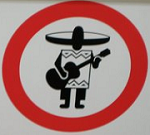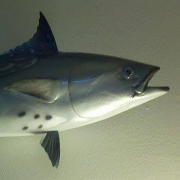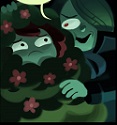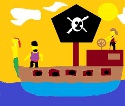|
jmzero posted:From a thematic perspective, it seems weird to have the core Venture Bros characters (other than Brock) be good at things, and be employing their legitimate skills to solve problems and defeat bad guys or pass tests or something. Having Rusty be good at science and Dean be good at sneaking (or whatever) makes it so you can impose "normal" game mechanics onto this setting, but the resulting game will be the opposite of how and why the show works. I do like your suggestion, of playing to try and keep the magpie-like Ventures alive as they chase the macguffin. I have several different ideas of ways to approach a Venture Bros board game appropriately, but I was mostly at a loss as to how to model the type of frequent failure and personality flaws so standard to the VB characters in a compelling game structure that might appeal to other, non-VB board game niches. But keep in mind that I'm only posting about the core mechanic of resolving checks and direct conflicts in this design, not the rest of the game's content and mechanics which will address these issues a little more. That said, your concerns are all something I've been through with myself already, and still reconsider from time to time. Since I started thinking about a Venture Bros based boardgame, I went through several different ideas for designs that approached different key elements of how the show's characters interact. I brainstormed a semi-coop card game, where players play a round cooperating as individual Venture family members to avoid/escape/resolve The Monarch and The Guild's plots and various avenging, and then play the next round as The Monarch and Guild members trying to foil/arch/whatever Venture and his family (all with cards played into common stacks and shuffled, so no one knows who is playing what villain until the end). I brainstormed a competitive game where drawn cards or tiles formed branching and intersecting tracks for exploring different locations or advancing/regressing along different plots, with Ventures trying to work up and forward towards happy/successful resolution and the antagonists trying to push them down and back on the tracks, with various card types. And a few others. But while I never really hit on a perfect mechanical structure to apply to the show's peculiar tone and characters, I thought of the prevalent advice to try designing the game you'd most like to play, and I settled on just that: a large, sandbox-style Venture game with multiple compelling and thematic routes to victory and some heavier, strategy mechanics (as modular as possible, so players can mix and match to create their own custom factions and adventures). I outlined some of my reasoning for this design in the design diary post I linked to on the last page, but in summary, the aim of this design is to let players be free to pursue:
Additionally, I intend for this game to have 6 factions to start, with more expandable, all with their own adventure/plot twist cards tailored to those characters and whatever other characters are chosen for each game. There are lots of locations from the show that provide different types of adventures and tactical advantages. There's opportunistic profiteering to pay for fancy vehicles and flashy gadgets. I'm trying to tailor the "combat" system to be about far more than fighting, where any of the 4 stats can be chosen for a round of combat, and the result is tailored to not only who won, but also what stat was used by each side. (Exploring characters can flee instead of fighting and leave a hinderance/penalty on their attacker. Sneaking characters can use the combat as a chance to go into hiding and try to stage an ambush, or steal an attacker's item or vehicle. Thinking characters can try to capture an attacker/defender as a hostage, or disable an attacker's item.) I'm hoping to tweak it more, with good stat/skill balancing, so that outcomes like you worry about, say Doc just punching out Phantom Limb, can't happen on their own, and require coordination between teaming-up characters, or other advantageous circumstances. I also cut more mechanics around building new labs and other buildings that would become hotly contested points of interest, mechanics around researching in different fields for different bonuses and inventions, mechanics to affect team interaction and individual characters' relationships with each other, and more. It was all too much. I understand how it seems a bit odd to have a sandbox strategy adventure game themed on the Venture Bros, but it's not the only game I have I could theme on it, and it makes it easier to re-theme it if a publisher wants a different IP. Also, there might be enough room in the market for a heavy strategy VB game and a lighter, more closely thematically matched VB game. But I welcome all ideas and suggestions. EDIT sector_corrector posted:Does the theming have the characters working as a team? If so, then I can see a big pile of tokens for the entire team (separated by color). This represents the collective skills of the entire team being applied to various tasks. That cuts down on table space and fiddly accounting, but still gives you the same mechanic. I'm definitely keeping your mechanic in mind though, either for this or another project. JMBosch fucked around with this message at 23:54 on Feb 5, 2016 |
|
|
|

|
| # ? May 12, 2024 21:04 |
|
One final thing RE: the pile of tokens idea, is that you could just have a pile for each character, and throw every color in there. A little less elegant, but it does cut down on bloat. Also, this is sort of off the wall, but one idea to incorporate both suggestions would be to have each character mechanically do different things. One character is the mastermind, and has all of the skill cards, two characters are field agents and are represented by token piles, and maybe one character is the wildcard, and is represented by dice. The field agents go out and do events. The mastermind character doesn't move in the field, and instead may contribute one of their cards per round to a check. The wildcard character can't make checks by themselves, but their dice can be put towards another check. That gives you thematic consistency (like, it makes sense that Rusty is shouting orders over the intercom while Brock is actually bashing heads, and Dean is accidentally killing people by stumbling into them and knocking them off a cliff).
|
|
|
|
Your mechanic ideas are good, and I'm enjoying finding places amongst my other designs where they would fit well, if you don't mind. For this VB game though, after another brainstorming session where I was testing out some of these ideas, I think I may just go back to numbers for each stat and leave the skill icon basics for a different design. If I can keep the numbers fairly low, (like 0-2 points per stat on the static character card, and 1-5 on the one skill card you can play per character per action) then the math will be fairly light. And low numbers would help me reinforce that individual characters are mostly weak on their own (except Brock), and that while you can split up, cover a lot more ground, and try to let characters have their own adventures, it's dangerous. But cutting out icon matching altogether and just replacing it with basic numbers is a lot quicker, if the math is small. I can also still have 1 or 2 action/skill spaces on the character cards where a cube can be spent for 1 or 2 points in some stat or another. If I remove some low costs I had on most simple actions, and just limit the number of actions more directly, gameplay flows quicker, and I can thematically have some characters completely useless in one stat and reliant on other characters, items, vehicles, henches, or allies for it. (Like Dean and Hank getting maybe 1 Fight point across all their cards, and Doc maybe 2.) To foster more conversation: Anyone have any ideas or discussion points for an asymmetrical, dystopian espionage and terrorism/policing game with an interview/border crossing mechanic like Sheriff of Nottingham, or anything else where you question other players about in-game information as a game mechanic? I did some decent work on a 3-5 player design like that, originally inspired by Papers, Please, The Resistance, and Euphoria, where players, with public allegiance to 1 of 3 factions but private allegiance to who knows, oversee multiple agents of similarly questionable loyalty in vying for control of various mega-city sectors. Players have to publicly semi-cooperate to keep the 5 pillars of society from collapsing (5 non player, interdependent factions represented by tracks that produce different resources and things), while privately advancing their own goals by positioning their loyal agents in the right sectors with the right resources to pull off missions and trying to identify their disloyal agents and get rid of them. I had some good progress until I hit a brick wall when it came to the the interview mechanic that actually inspired the idea in the first place. My idea was that the controller of a border has the option to interview a player when that player's agent crosses their border and they want to challenge the player's reason for it. I haven't worked on it in awhile, but it's been in my head for awhile lately. And I still can't crack it.
|
|
|
|
Man this thread got DENSE lately.JMBosch posted:Venture Brothers! Poison Mushroom posted:Space 4X!
For edicts, why not have a set of Edict Cards that you put together in order to build them? So you could actually use the cards as a way to enforce a complexity limitation on edicts. What if the ways to win the game are voted on by the Council? Maybe the Council is some sort of Representative Democracy and your votes are based on different cards you've collected? Planets could each be worth one vote to represent the population of them by default, but then certain planets could be more densely populated and worth more. Technologies could let you steal another player's planet for the purpose of voting in the Council. Events could make your planets incapable of voting (and therefor be a reason you don't want to be last in turn order). I've only really played Cosmic Encounter so I apologize if these suggestions are really close to some stuff from Eclipse or Race!
|
|
|
|
Misandu posted:I think getting rid of the skill icons is a good move. I'm still not even 100% sure if the actual icon meant anything or if it was just the picture? Your Rusty example has him with some skills at two but uses two of the level one icons? It looks like those icons in the circle should be triangles according to the stuff about the skill icon reference card. I still like the idea in theory as a way to show different strengths and weaknesses within a character's stat, (some intelligent characters are good at building things, others at solving problems and puzzles, others at plotting to catch their enemies, etc.), but I need a simpler design in another theme to fit that idea in. Misandu posted:
It reminds me that I've wanted to put an expanded version of the relationships system in Fiasco into a boardgame. In Fiasco, players, each a character in the story, start with a simple notecard in between them and each of the players on either side of them, which dictate some general aspect of the relationship between the characters or their past together. Things like "< Coworkers >" or "< lawyer / client >" or " < ex-lovers >". In Fiasco it's simply an aid to help the players improvise scenes between the characters, but in a bigger, negotiation type of game, you might be able to have some fun with forcing the players to incorporate past, pre-game histories between their empires or something. Like the player to your left's empire was responsible for a terrible genocide 400 years ago, including some victims from your people. How does that affect negotiation? You can leave all those types of things up to the players in the moment to come up with as justifications for their decisions, but I think codifying it in a simple system, or even just flavor cards the players are free to use or not, would add a sense of history to the groups the players are playing as.
|
|
|
|
How would you go about a win condition design in a 2-player head to head card game with no location-based positioning that does not revolve around numeric damage accumulation? I'm trying to think of a way to make a game that only requires cards and nothing else, and the only thing I can think of is milling the enemy's deck or having specific win condition cards. I think with win condition cards the problem would be what if you never get the cards you need? I wouldn't want to base the whole game around luck.
|
|
|
|
Well, I went ahead and ignored all the advice given to me, and typed up some rules for 4D Space. Think I'm gonna playtest it in PBP and IRL, and see how I feel about what happens.
|
|
|
|
quote:How would you go about a win condition design in a 2-player head to head card game with no location-based positioning that does not revolve around numeric damage accumulation? I'm trying to think of a way to make a game that only requires cards and nothing else, and the only thing I can think of is milling the enemy's deck or having specific win condition cards. I think with win condition cards the problem would be what if you never get the cards you need? I wouldn't want to base the whole game around luck. Do you have any kind of persistent tableau? Something like "first player to have X cards in each of two different categories" could work. Then, perhaps, you have most of the categories (the ones that are more useful for success in the game, like goldenrod Factories or salmon Helmets or whatever) require 7 cards, but still keep victory cards around that are less useful in the game, but require a smaller set to count as one of your "dominant categories" (like, you only need 4 chartreuse Prestige cards down to count as one of your win conditions). I also think "set number of rounds" is underrated sometimes.
|
|
|
|
signalnoise posted:How would you go about a win condition design in a 2-player head to head card game with no location-based positioning that does not revolve around numeric damage accumulation? I'm trying to think of a way to make a game that only requires cards and nothing else, and the only thing I can think of is milling the enemy's deck or having specific win condition cards. I think with win condition cards the problem would be what if you never get the cards you need? I wouldn't want to base the whole game around luck. You could just have some cards that begin in play? Maybe even a separate deck full of win conditions or something. Poison Mushroom posted:Well, I went ahead and ignored all the advice given to me, and typed up some rules for 4D Space. Think I'm gonna playtest it in PBP and IRL, and see how I feel about what happens. Seems interesting! Let us know how it goes or if you want to run a PBP game.
|
|
|
|
signalnoise posted:How would you go about a win condition design in a 2-player head to head card game with no location-based positioning that does not revolve around numeric damage accumulation? I'm trying to think of a way to make a game that only requires cards and nothing else, and the only thing I can think of is milling the enemy's deck or having specific win condition cards. I think with win condition cards the problem would be what if you never get the cards you need? I wouldn't want to base the whole game around luck. The DBZ tcg has 3 win conditions: 1) Survival. In DBZ your deck is also your life, and as soon as you run out of cards you lose. There's two types of damage, stage damage (generally physical) and life card damage (generally energy). Stages are things your character has and pays to use different card effects, losing them means you have fewer resources to spend and also any "overflow" stage damage becomes life card damage, making getting locked at 0 stages very scary. Life Card damage is basically mill (though there's also ACTUAL mill, called "destroying" cards off the top of your opponents deck). 2) Most Powerful Personality Victory. Each deck's main character ("Main Personality") has four levels with increasingly stronger effects tied to them, and you can access these by either playing cards that immediately level you up or by gaining 5 Anger. The former generally locks you out of the MPPV win condition, but decks which revolve on getting to level 4 and then getting another 5 anger - thus triggering MPPV - have been successful at different points in the game's life. Similarly there's effects which stop your opponent from gaining Anger, lower their Anger/Personality level, etc. 3) Dragon Ball Victory. If any player has all 7 Dragon Balls (special 1-per-deck cards with very strong effects and a handful of unique rules like "cards that search for cards can't search for DBs unless they specifically say so" and "DBs can't be destroyed through damage and instead are placed at the bottom of a player's deck") in play under their control they immediately win. Dragon Balls can be captured from the opponent by dealing enough damage in a single hit or several other specific card effects. Generally you build a deck to do 1-2 of these things, though "namekian triple vic" was a popular archetype for a while. A Garlic Jr. Perceptive Black deck is going to try to win by MPPV with a secondary focus on DB victory, an Android 20 Adaptive Orange deck will only care about Survival (though a slower, control-style Survival), and a bunch of others. MPPV is really the only one that's just tracking numbers, and even then it's much more dynamic than "reduce opponent's life to zero" because anger tech varies heavily by style. Maybe look into the game if you want ideas.
|
|
|
|
I have poor impulse control.
|
|
|
|
JMBosch posted:To foster more conversation: Maybe have some of the pieces on the board have secret owners, so the pawns are all gray with the actual player color on the bottom (or no color). They move semi- autonomously and every time they cross a border everybody gets a chance to secretly add contraband or information cards or whatever to their cargo. But the cards do different things depending on if their color matches the pawn or not, so if a blue agent crosses the border with a red tech card nothing happens, but if they bring a blue tech card over they can use it as a bomb. The border owner can detain the agent, but he must correctly guess which player they belong to.
|
|
|
|
Dr. Video Games 0069 posted:Maybe have some of the pieces on the board have secret owners, so the pawns are all gray with the actual player color on the bottom (or no color). They move semi- autonomously and every time they cross a border everybody gets a chance to secretly add contraband or information cards or whatever to their cargo. But the cards do different things depending on if their color matches the pawn or not, so if a blue agent crosses the border with a red tech card nothing happens, but if they bring a blue tech card over they can use it as a bomb. The border owner can detain the agent, but he must correctly guess which player they belong to. This would also make for quite an easy set-up for a quick interview mechanic. I originally was trying to think of complex combos of missions and targets that players had to grill each other over, like an intense interviewer trying to find key information and whether or not it matches with their own intel. But with your idea, the interview mechanic can be as simple as the border controller trying to determine whose agent it is at their border. Even if a player has absolutely nothing to do with the agent, simply responding with "That is definitely not my agent. I have no clue who they are." would seem pretty suspicious. You guys are good at simplifying my needlessly overcomplicated ideas! Now I just need to figure out a good and thematic AI movement system for the agents, since they don't have a public loyalty or controller anymore, and some interesting mechanics for influencing them secretly. I also gotta determine when and how agent tokens are revealed to everyone, when they're replaced with new agents, etc. Maybe agents are "activated" by a player playing a card and declaring the agent color and district color match the card they're playing before actually checking. So you play a Sabotage card or something that requires "blue agent in red district," and turn over an agent token in a red district your PRETTY SURE is blue, but if they're not there's some penalty on the Sabotage card for picking an agent for the task that doesn't listen to you.
|
|
|
|
The skill icons in polygons is a really neat choice. The star/sawblade shapes are less clear.
|
|
|
|
JMBosch posted:Now I just need to figure out a good and thematic AI movement system for the agents, since they don't have a public loyalty or controller anymore, and some interesting mechanics for influencing them secretly. I also gotta determine when and how agent tokens are revealed to everyone, when they're replaced with new agents, etc. What's coming out my head right now is multiple variables. Agents have a color and a number on the hidden side and are placed at random at the start. Turns have essentially two phases: intel and action. I would keep it soft so actions can come unexpectedly. Players get a hand of cards with colors or numbers which is open knowledge. Players play a card with a color on an agent in the matching colored district to reveal that agent to the owner of that district. A player can move any agent to any other district instead of revealing an agent. At any point during a player's turn they can declare an action against another player using a specific agent in that player's district. That agent is revealed to both players, and if the color matches the player who took the action the action succeeds unless the affected player has a card matching the agent's number. In that case the action fails and the agent is returned to the board loyalty-side down. Point grab actions are declared pass or fail to the other players not involved in the action. Actions are generic point grabs. Each player starts with a pool of points (influence), and the goal is to gather enough to gain control of the city/state/country. Canceling an action I'm still undecided on "has" or "plays." That would depend on the amount of numbers available. If every agent is unique then you'd only need to have his number to control him. This would allow some trade actions. Perhaps a player can always trade a number card for a number card as his turn's action and does not require the other player's permission to do so. This is just a quick brainstorm. Still struggling with successful actions giving partial perfect information, but I suppose that's the nature of the beast.
|
|
|
|
Casnorf posted:If, thematically, agents are controlled via dead drops or other asymmetrical media, why not just let anyone control every agent? Not all at once, but you know, half the game could be figuring out who's really loyal to you.... rchandra posted:The skill icons in polygons is a really neat choice. The star/sawblade shapes are less clear.
|
|
|
|
JMBosch posted:Ya, I was worried they'd kinda blend together over time. I have an idea of how to use skill icons similarly, but more simply, in another design, so I'll keep the simpler polygon shapes for those. I don't get why they were associated with numbers on the reference card. Why associate Skill C with the number 3 if the skills associated with 1 and 2 can't be assigned together as the skill associated with 3? Hey don't read this if you're playing in PM's game! This seems really interesting from what I've seen so far, but Military sort of seems like it might be a trap with the current rules? It's hard to be sure without seeing all of the cards, but right now it looks like Military Technologies are strictly inferior to other Technologies. You're paying money to get access to a special form of money that you can only use for one thing. Maybe it's just that Metal-Rich Planet is one of the best cards in the game or something, but just compare MRP to Radical Lasers and Quantum Coins. MG2 would be in a better position if they had passed their turn completely and just taken Byer's MRP. Military stuff should probably be much more efficient to offset the loss of a Delegate Phase (you either spend one Declaring War or lose one from fighting an Illegal War), and the ill will you generate from it. Right now it just seems like you'd have to spend two turns and $6 minimum just to get to the point where you can wager $1:$1 to take planets from people who have been investing their money into more money. Having said that I think MRP is probably too good? MRP is worth $2-$3 ($4 if there's an Iron + Platinum Tech) a turn. Rapid Terraforming is worth $0-$1. Radical Lasers is worth $0-$3 ($0 if no one attacks, $3 if everyone attacks). Kashnu really should have voted yes on MG2's Edict, they need to team up and absolutely crush Byers with Edicts this turn or they're gonna end up in a huge hole. Turn order is going to be really important in Round 2!
|
|
|
|
Misandu posted:I don't get why they were associated with numbers on the reference card. Why associate Skill C with the number 3 if the skills associated with 1 and 2 can't be assigned together as the skill associated with 3?
|
|
|
|
JMBosch posted:Using numbers on the reference card my have confused more than it clarified. Letters might have worked better. While the icons weren't meant as interchangeable, it was important to show that some icons (the "higher numbered" ones) were more powerful, in that they were more difficult to generate and could be spent on bigger, more powerful actions. You couldn't add skills together to make better ones, but the reference card was supposed to communicate that it was still important to remember which skills were "stronger" than others. Oh that makes sense! I agree that it's important to communicate that to the player but that maybe wasn't the best way to go about it. I think that system would cause a lot of frustration for players. If I have a card that produces rare resources then I am going to be inclined to save it for when I need the rare resources. That could work great in a Venture Brothers type game though! Maybe the cards all represent equipment or training that your character has, and have a combination of Rare and Common Skills. The problem is that they're all MADDENINGLY SPECIFIC. So maybe you have a Shrink Ray that can permanently generate 1x Technobabble, but can also be discard to generate 1x Power Source (you rip the battery out of it). If you spend the whole adventure carrying around a Shrink Ray just in case it's super rare icon comes up the other players get annoyed that you're not contributing as much as you could, but the second a Tecnobabble icon comes up after you discarded the Shrink Ray everyone gets to feel like an rear end in a top hat. Then you could have it where Brock can use anything as his type of icons, but has to discard it. Maybe Dean can grab random cards off the top of someone else's deck, convert one to his icons, then discard all of them. Basically the entire game is built around being well prepared 10% of the time and just sort of randomly smashing square pegs through round holes at the cost of efficiency the other 90%?
|
|
|
|
Misandu posted:Oh that makes sense! I agree that it's important to communicate that to the player but that maybe wasn't the best way to go about it. I think that system would cause a lot of frustration for players. If I have a card that produces rare resources then I am going to be inclined to save it for when I need the rare resources. That could work great in a Venture Brothers type game though! Maybe the cards all represent equipment or training that your character has, and have a combination of Rare and Common Skills. The problem is that they're all MADDENINGLY SPECIFIC. So maybe you have a Shrink Ray that can permanently generate 1x Technobabble, but can also be discard to generate 1x Power Source (you rip the battery out of it). If you spend the whole adventure carrying around a Shrink Ray just in case it's super rare icon comes up the other players get annoyed that you're not contributing as much as you could, but the second a Tecnobabble icon comes up after you discarded the Shrink Ray everyone gets to feel like an rear end in a top hat.
|
|
|
|
In respect to distributing challenges, rewards and quest objectives out at a location, I've always known that the Pathfinder card game did it wrong. What however are some options for "right?" PF is basically a bullshit lottery that tests if you have the right + next to the right skill with no forethought. What would have been better? I'm theory crafting a few ideas here and I'm not seeing any successful precedent. Maybe when (in a game with a similar structure, ultimately, if hopefully executed better and differently) a location is visited there are less cards, but they are all revealed in a grid that lets players "pick at" from the outside-in to actually provide choice? Any good ideas? Any way this has been done before that isn't poo poo?
|
|
|
|
Harvey Mantaco posted:In respect to distributing challenges, rewards and quest objectives out at a location, I've always known that the Pathfinder card game did it wrong. What however are some options for "right?" That's something I ran into with my Betrayal rework. I think my ruleset still has a lot of problems regarding this too. However, one approach I took towards that problem was to have the three floors of the Hotel focus on different things. Main floor are moderate challenges that let you build your deck. Bottom floor is high risk / high reward stuff with more difficult checks. Top floor is mainly about finding keys (the endgame trigger) and revealing archetypes (the traitor game portion). It's never spelled out, but the hope is that the players figure it out over time. One option might be a market row system. Market rows work best in deckbuilders when there's a way to significantly interact with them, and they have the advantage of giving a lot of randomization, while still allowing player choice in what they approach. They also allow for player-to-player interaction by taking cards that might be desirable for their opponents as an offensive move. I have a Fallout Ameritrash game (working title) write-up that plays with this idea: there are encounter cards, divided up between easy, intermediate and hard decks that are shuffled and stacked on top of each other. Encounters are laid out in a 4 x 4 grid drawn from the top of the deck (so, easy first). To start the game players lay out 16 cards randomly, and turn over 4 of them. Subsequent abilities allow you to 'scout', meaning that you can turn over a certain number of these cards, although usually more than 1, so you're also giving the next player an advantage. There must always be at least 4 of these visible on the board, so if you've completed all of the face-up encounters and nobody has scouted, then you have to make sure that there are some visible. In the event that everything face-up is undesirable then you may tackle a face-down encounter and take your chances.
|
|
|
|
Harvey Mantaco posted:Maybe when (in a game with a similar structure, ultimately, if hopefully executed better and differently) a location is visited there are less cards, but they are all revealed in a grid that lets players "pick at" from the outside-in to actually provide choice? Any good ideas? Any way this has been done before that isn't poo poo? So imagine a 3x3 grid of cards or tokens at the location (face-up or face-down, depending on your game). If you have 4 stats total, for example, in 2 sets of polar opposing stats, you could have cards in the bottom row cost 1 strength or 3 intelligence, and cards in the top row cost 3 strength or 1 intelligence. And vice versa for left/right and the other 2 stats.
|
|
|
|
So I recently remembered I was writing an RPG called "monsterworld", based loosely on the world of Digimon with original monsters. My goal with this was to make a RPG that had bits of not too complex combat mixed with the feel of the show where the human characters all had conflicts with each other that are resolved over the course of the "season"/campaign. Something I don't think I've seen emphasized in any RPG. I'm taking inspirations from a lot of sources including FATE, 13th age and Dungeon world. I'm not sure if I'm bl;ending different elements well, or making an unholy amalgamation. It still needs quite a bit of work, but here is what I have so far
|
|
|
|
Market Row for an exploration/Betrayal style game sounds like a really interesting idea! Grid with varying costs depending on how you approach it sounds like a really cool idea for type of tech tree (so research X is cheaper if you come from direction Y) but I think that would be something you'd want to set up with some strict rules instead of super randomly.Foolster41 posted:So I recently remembered I was writing an RPG called "monsterworld", based loosely on the world of Digimon with original monsters. Have you looked at any *World games, this might sound crazy but I feel like Monsterhearts might be a good inspiration for this? Monsterhearts is all about the characters being supernatural creatures that are all based on struggling with things like depression or addiction, and how they get along with the world and each other. Digimonsterhearts could be similar that that, maybe your monster represents a sort of idealized version of yourself that has all of your features exaggerated. You might be a little bit brash and not get along with your big brother super well, but your monster is constantly charging head first into things and trying to one up his monster. Do you try to get your monster to relax and see how important your brother is to you, or do you let yourself get lost in having a best friend who's everything you are but more? How does this affect your relationships? Okay the rest is just stream of consciousness feedback. Also your +1 to +5 matches pretty well to *World's -1 to +3 thing, and Aspects could really easily be Moves for the Monsters. Actually looking at it, your monster write ups at the end are already pretty close to how playbooks work. I skimmed over combat and it seems really basic, as if it's just there to justify the monster thing. I don't think there is enough going on to justify divorcing it from the Human Character stuff, why not just stick to FATE's stress stuff for the entire thing? Seeing your monster get hit by a powerful blast causes you to take stress or consequences like regular combat would in FATE, then you can use the effects of fights to drive the interaction between the player's characters. Maybe you took a severe consequence defeating Metal Mimir that your character feels is the fault of the kid he bullies all the time, or maybe the kid you bully all the time took one for you?
|
|
|
|
Misandu posted:Have you looked at any *World games, this might sound crazy but I feel like Monsterhearts might be a good inspiration for this? Monsterhearts is all about the characters being supernatural creatures that are all based on struggling with things like depression or addiction, and how they get along with the world and each other. Digimonsterhearts could be similar that that, maybe your monster represents a sort of idealized version of yourself that has all of your features exaggerated. You might be a little bit brash and not get along with your big brother super well, but your monster is constantly charging head first into things and trying to one up his monster. Do you try to get your monster to relax and see how important your brother is to you, or do you let yourself get lost in having a best friend who's everything you are but more? How does this affect your relationships? Yeah, this game takes some inspiration from *World, perticularly the bonds system. I like the idea of the pesonality of the monsters representing the issues with the other humans. I'll have to work that in. The game has gone throug a LOT of changes. It was originally almost completely based on the older FUDGE, and then was a bit more based on *world, and even had grid-based combat added in the latest vesion before I got back to it (which I removed). But since I last worked on this I was introduced to 13th age, and I liked the idea of working in some of the more tactical elements from it. Honestly, while I like a lot of ideas in *world, I'm not a bit fan of how conflict resolution works. (Not saying it's bad, just feels odd to me, and I can't put my finger on exactly why). quote:I don't think there is enough going on to justify divorcing it from the Human Character stuff, why not just stick to FATE's stress stuff for the entire thing? I'm not sure what you mean. Get rid of the monster attributes and just have damage tracked on their human companion? Maybe. I'm wondering if this mish-mash is to complex and maybe I should make this all completely a FATE game instead, with the attributes more like FATE skills (and none of this increased scale thing). It's something I've been considering. E: Also, what do people think about the idea of having the "mind" attribute basically be used for more "casts" of different 1/encounter and 1/session abilities? It seems to just be just the same as a mana system (which was in the previous version of this game), but it feels a little more manageable somehow to me. Also, maybe it makes more sense and is interesting if you have to lock down what abilities you get extra uses of at a rest, sort of more like a classic RPG wizard. E2: Maybe the idea of limited powers is just made up in stunts/abillities instead. Thinking about it, I think I will make it more like FATE with the skills. Foolster41 fucked around with this message at 03:56 on Feb 24, 2016 |
|
|
|
I just feel like if you're going to have a separation between the Characters and their Monsters for combat then combat has to be really distinct from everything else, like when you had the grid based combat. If you're going to go full FATE based (which I think is a good idea) then I think you could do some cool stuff. FATE already sort of encourages you to find cool ways to use all of your skills in combat, so why not really double down on that? Maybe your Monster's abilities are all based on your Character and what they can do but turned up to 11, instead of setting what Abilities your monster has you assign it some of your Skills for different purposes. So instead of your Monster having Spin, Wings, and Shot your monster might have Crafts, Notice, and Provoke that it uses for similar purposes. Then you can give suggestions for what a monster using a skill is doing to help get people creative. I guess I'm thinking you'd treat skills assigned to your monster as sort of open ended stunts?
|
|
|
|
Misandu posted:I just feel like if you're going to have a separation between the Characters and their Monsters for combat then combat has to be really distinct from everything else, like when you had the grid based combat. If you're going to go full FATE based (which I think is a good idea) then I think you could do some cool stuff. I like the idea of directly tying human skills with the mentor abilities. I definitely want something that ties the human companions with their monsters. Maybe i'm misunderstanding, but you're saying your suggestion is to make monster skills open ended stunts, and no asking if that's what I'm doing, right? Making them open ended based on the skills seems like a bad idea to me. Even in FATE they are pretty well defined before hand what you can do. Also, I like the idea of having a sort of build-your-own power system, and being able to do a little bit "meatier" combat, closer to 13th age. It seems more fitting for the settings to have different named attacks and abilities. E: I did some editing. I added some more description and some art. I think I have down just everything that's unique and the only stuff I don't have written is the stuff that's the same as FATE. I think the only mechanical thing I'm missing is maybe more on how the resolution of conflicts/bonds work. Thinking about it, I really like the idea of monsters being able to use their human companion's aspects, if it make sense for the situation. I think this works better mechanically with FATE and is more manageable. Foolster41 fucked around with this message at 00:49 on Mar 1, 2016 |
|
|
|
I only know a little bit about 13A, but I always felt the combat stuff wasn't interesting enough to use over something like FATE. There's a lot of little things you can do but it never seemed like the system really had any decisions to make, more that you have a list of things to look out for and go "Oh! _______! That lets me..." Maybe it works out a lot more interestingly in practice. I think "Open Ended Stunts" might have been a weird way to word what I was getting at, any sort of build your own power system is going to be pretty similar to what I was thinking of anyway. The main thing is that when I think of "kids with monsters going on adventures" I don't usually think of the monsters having well defined powers with reliable effects.
|
|
|
|
Misandu posted:I only know a little bit about 13A, but I always felt the combat stuff wasn't interesting enough to use over something like FATE. There's a lot of little things you can do but it never seemed like the system really had any decisions to make, more that you have a list of things to look out for and go "Oh! _______! That lets me..." Maybe it works out a lot more interestingly in practice. I've been GMing 13th age for a while, and I realty like how the combat system works. Though yeah, I'm not sure if trying to combine it with FATE makes sense, but I'm giving it a try. Maybe it kind of negates the purpose of using a system like FATE in the first place. Well, I feel like I need to have some definition of what powers do, at least in a vague sense rather than stunts, for example "this attack doesn't do damage, but poisons instead". And it seems to me the effects of the attacks in digimon for example were pretty consistent. Though looking back, most of the attacks were just a single beam or missile attack, so maybe less constant and more they were all effectively the same with a different look/element type (fire/ice/physical/magic/etc.).
|
|
|
|
The first post in this thread is over three years old. Some of the links are dead. Is TheGameCrafter still not recommended?
|
|
|
|
quote:The first post in this thread is over three years old. Some of the links are dead. Is TheGameCrafter still not recommended? I think it depends on what you expect from them. I've bought some prototyping bits and bobs from them (meeples and what not) and been perfectly happy with the service. But there's cheaper ways to print small card runs (there's actually a lot of these types of services now..), I don't think they produce a "whole game" in any sort of economically scalable way, and I don't think they provide value in terms of promotion or something. They seem to function the same way traditional vanity publishers work - fine if you want a few copies to give to friends (assuming you don't want to make your own prototype board, which will likely be at least as nice as what they'd make), but you wouldn't want to do any kind of real production run with them. jmzero fucked around with this message at 17:16 on Mar 3, 2016 |
|
|
|
Foolster41 posted:I've been GMing 13th age for a while, and I realty like how the combat system works. Though yeah, I'm not sure if trying to combine it with FATE makes sense, but I'm giving it a try. Maybe it kind of negates the purpose of using a system like FATE in the first place. I see what you're going for. That might be a much better way to approach it too, as it would keep the monsters from having too big of an impact on how the characters solve problems. I'll definitely check out what you've got together when I have some time this weekend!
|
|
|
|
So I had someone who's playtested for me before convince me I should just take my most polished design and try to get it published. But that's an angle I've never yet had to consider, so I am very, very lost. What should my first steps be?
|
|
|
|
Anniversary posted:So I had someone who's playtested for me before convince me I should just take my most polished design and try to get it published. You are a single unknown quantity in a sea of unknown quantities, at least a few of whom probably deserve the opportunity more than you do. You don't have pedigree or name recognition, all you've got going for you is your game, probably just a single play through of it, if you even get that far. So make sure that one play is the best it can possibly be. Or just find some buzzwords and make a Kickstarter. 
|
|
|
|
Poison Mushroom posted:Playtest it more. And more. Blind groups, guided groups, small groups, large groups, gamer groups, normie groups. Right off the bat, I know this, agree with it, and appreciate your stating it. That said, I have done intensive amounts of playtesting. The game is somewhat modular, and the content I would want to try to publish has been been through upwards of hundreds of tests. But never blind. That's due to a combination of factors. For one, while I like to pretend my rules are decipherable, they probably aren't clear/intuitive enough in their current presentation. But, more pressingly, I have zero people interested in blind playtesting. So for that reason I shelved the game. And the next one. And the next one. So it basically came to the point where I was told I should just try to get past the point I'm at and get something out the door, sink or swim, to see what happens. Possibly because shelving games doesn't really help me grow as a designer.
|
|
|
|
Anniversary posted:So I had someone who's playtested for me before convince me I should just take my most polished design and try to get it published. For genuinely real, if you're in the right area (St Louis) try to attend the Stonemaier Games design day. http://stonemaiergames.com/about/events-conventions/ Whether or not you like their games, it's difficult to deny that Stonemaier is an excellent publisher and a very good kickstarterer, so you could do worse than getting it picked up by them.
|
|
|
|
thespaceinvader posted:For genuinely real, if you're in the right area (St Louis) try to attend the Stonemaier Games design day. http://stonemaiergames.com/about/events-conventions/ Thanks for the advice, sadly I am not. But to both of you, thanks for the reality check. Positively, I did have a friend put in me touch with a publisher who offered to give it a look just to give me some feedback, which should be nice. (That's all I'm expecting, as the design doesn't match their catalog in the slightest.) But I haven't heard back from them since I actually passed along the design, possibly because they are currently in crunch time...
|
|
|
|
I have an Argent variation I would like notes on MUTINY! Mutiny! is a game played by 2+ players where you try to gain control of a pirate ship. Each player is a defector plotting against each other and the captain. The game proceeds basically like Argent, with hidden supporter cards. Each card has a condition for support, like "most gold" or "most food" or whatever. Each card also has a minimum amount required to support you. The game has no turn limit. Score is tallied when one player yells "MUTINY!" at the beginning of their turn. Once Mutiny! is called, you tally supporters, dealing the card to whoever wins their condition, and a winner is determined who very well might not be the person who called the end of the game. Ties for support are not dealt to players, and support the captain instead. Any supporter whose condition is not met supports the captain. This prevents people from calling Mutiny! too early, because EVERYONE might lose. The captain is not a player, just a lose condition. Each turn, a player can view one supporter's card, without showing it to the rest of the players, then put it back. It's up to the player to remember which supporters support based on which conditions. I have not determined what systems I'd use to generate score and what resources I'd have, just "build score, hidden from the rest of the game, and call the game when you THINK you've won it." I'd like to add some stuff to interact with other players.
|
|
|
|

|
| # ? May 12, 2024 21:04 |
|
signalnoise posted:I have an Argent variation I would like notes on Would this be with the normal Argent rules and a modified board or are you just evoking Argent as the inspiration?
|
|
|



